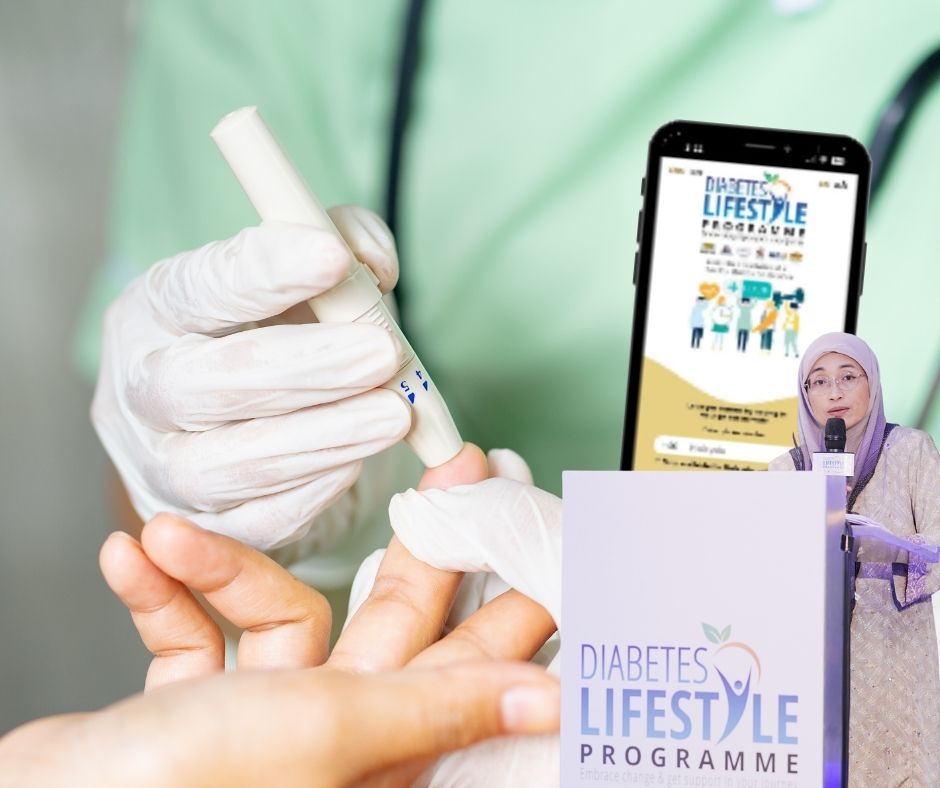
Diabetes is a big issue in Malaysia. Everyone and their uncle has it, our friends and parents likely have it, and frankly, especially if your ancestors are from this region, you may have a genetic risk of developing it (if you haven’t already). Not to be alarmist, but an US study has said that one in four people with diabetes there don’t even know they have it.
Rapid changes in lifestyle and diet have occured as we have developed. We don’t need to tell you that people are becoming more sedentary and eating less nutritious food. Also, Malaysia has an aging population – which means more complexity, and that… costs a lot of money. Obviously.
Clearly, it’s important to address this issue, and so, Malaysian healthcare experts have launched a Diabetes Lifestyle Programme (DLP) to make lifestyle changes part of the normal treatment for this widespread health challenge in our developing nation. Okay. A programme. Let’s take a look.
The DLP seeks to help people with diabetes improve their wellbeing and reduce the problems that come with the disease for patients, families, the healthcare system. The programme means to move us away from pharmaceutical interventions for diabetes (Diabetes Mellitus Type 2 or DM-II).
There’s been a body of research that supports the idea that patients can regress from diabetes without pharmaceutical intervention, in some cases, in less than a year. This happens when a patient’s haemoglobin glucose test (HbA1C) yield results of less than 5.5 consecutively for 3 months.
These concepts and studies were shared at the launch of the DLP programme by expert, Dr. Osama Hamdy, Medical Director of Obesity Clinical Program at Joslin Diabetes Center and Associate Professor of Medicine at Harvard Medical School. His research showed with the correct guidance, empowerment and direct support from HCPs, regression is possible. The guidance now is that regression should be the goal for patients moving forward unless chronically impaired.
Besides alleviating the expenditures that go towards managing diabetes, this approach focuses on partnership and connection with the community, which is arguably a pillar of support when one faces health challenges. The past 2 decades have seen huge shifts towards online connection, and clearly, embracing technology is part and parcel of any effort to support communities, but how successful will the DLP be in harnessing it?
The DLP Digital Patient Education & Support System is now available for healthcare providers to help their patients make lifestyle changes as part of their diabetes management. It’s a web-based app that offers support through a structured approach to lifestyle intervention, making it the first digital education platform of its kind.
To lead the programme, a panel of experts was formed with representatives from each collaborating partner and subject matter specialists. The DLP expert panel consists of eight medical experts, including one endocrinologist, five family medicine specialists, one general practitioner, and one sports physician, as well as four allied health experts, including two dietitians, one psychologist, and one diabetes nurse educator.
“Using digital health technology presents us with many new opportunities. Diabetes cases are increasing dramatically among younger adults in Malaysia. In this light, we believe our web-based application would be well-suited for this growing tech-savvy group. At the same time, our web-based app will also enable healthcare professionals to keep abreast of their patients’ progress.”
Datuk Dr Zanariah Hussein, Senior Consultant Endocrinologist, Chairperson of DLP Expert Panel
Um. A web-based app. Is it full of things that are easy to grasp that my grandma would forward me on Whatsapp? Let’s hope so.
Look, there is obviously more than one challenge that requires attention and investment to ensure all Malaysians have access to high-quality healthcare services. Resources are not distributed evenly, with better healthcare access in urban areas compared to rural regions. Public healthcare facilities may be underfunded and understaffed, leading to long wait times and limited access to services.
While this is arguably normal for a post-colonial, developing nation in this region with a predilection for affordable starches and sweet desserts, there is a general consensus, too, that the system has focused on treating illnesses instead of preventing what has turned out to be a high burden of diseases.
For instance, apportioning one’s rice, meat and vegetables using the “healthy plate” or “suku-suku-separuh” principle will ensure a balanced diet that meets patients’ nutritional needs. Choosing wholegrain and high fibre foods that take longer to digest will help avoid the blood sugar spikes that tend to occur when we consume refined carbohydrate alternatives.
Datuk Dr Zanariah Hussein, Senior Consultant Endocrinologist, Chairperson of DLP Expert Panel
Apparently, DLP has trained more than 3,000 healthcare professionals from different specialities of a diabetes care team, such as medical doctors, diabetes nurse educators, dietitians and pharmacists. While this seems to be a step in the right direction, at the PKG, we wonder if healthcare providers do not need more personable inroads to support them in suggesting the use of the web based app.
While food isn’t the only factor in diabetes management, this is Malaysia, after all, and can you really deal with blood sugar management without harnessing the immense and incredibly richly layered national discussion around food, especially with the festive season fast approaching?
With veritable Malay-language megastars like Khairul Aming and Che Nom becoming household names (with staggering numbers of subscribers which makes it statistically impossible that they do not reach Malaysia’s actual population), we wonder how come a more human element hasn’t been added to DLP’s outreach.
We need only look to neighbouring Singapore which pays attention to local food businesses in housing development areas to encourage and support residents to eat healthily. It is so easy to imagine a GP talking about food practices with patients when you know there are easy listicles and very readable (and forwardable) links. How is social media not the living heartbeat behind the DLP’s efforts, and why wasn’t it the main driver at the launch?
While we know Malaysia’s population isn’t as homogenous as Singapore as various communities here have such vastly different life experiences, nor is it as manageable in terms of infrastructure or funding – doesn’t that serve to amplify the need for a friendlier face than a web app suggested by healthcare providers?
Perhaps this is all in the works and this first step from March’s launch is just to highlight the infrastructure and teamwork within healthcare for the DLP, but as taxpayers, we suppose it is a question of ours that bears answering at least by the Ministry of Health, if not the hardworking people behind the coalition that has brought us this offering.
Rather interestingly, in a Health Policy Summit speech last year, former PM Ismail Sabri Yaakob tried to “offload responsibility” towards the nation’s healthcare by claiming it was not purely under the ambit of the Ministry of Health (MOH), but other parties including stakeholders, the public and private sectors, and civil society (which the DLP seems to fall under somewhat).
In response, former Health Minister, Khairy Jamaluddin noted that our public health spending was about half the minimum 5 per cent recommended by the World Health Organization (WHO). Khairy acknowledged that all ministries are requesting funding and acknowledged their significance, but emphasised that certain ministries are more crucial than others. To illustrate this point, he quoted George Orwell’s Animal Farm, stating that just as some animals were considered “more equal” than others, some ministries should be given greater priority and attention – further explaining to the prime minister that month long waitlists for critically ill patients are now de rigeur.
There’s a nagging feeling that healthcare really is the ‘forgotten child’ in the mix for the Malaysian government. While the DLP has been launched as a step in the right direction, still there is a need for a more personable approach to outreach to healthcare providers and patients – to say nothing of the funding clearly needed within the core infrastructure of healthcare itself. The app should be seen as a move towards addressing the strata of work within the system because clearly, more needs to be done to make medical knowledge and support more accessible and engaging for all Malaysians.



















